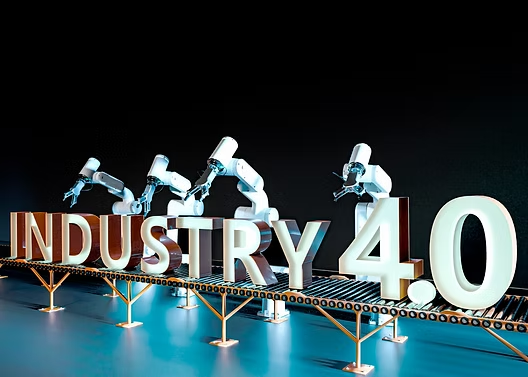
How Digital Transformation is Changing the Manufacturing Industry
January 20, 2026
In today’s fast-evolving industrial landscape, digital transformation is no longer a luxury it’s a necessity. For manufacturers, the pressure to optimize operations, reduce costs, enhance agility, and stay globally competitive is mounting. Technologies such as IoT, AI, cloud computing, and automation are redefining how factories operate, how supply chains are managed, and how customers are engaged.
But transformation isn’t just operational it’s also about marketing, communication, and growth. In this blog, we explore how digital transformation is reshaping manufacturing and how digital marketing for manufacturers, SEO services, and website & digital solutions can help your business lead this revolution.
1. Industry 4.0 and Smart Manufacturing
The Fourth Industrial Revolution or Industry 4.0 has brought smart, connected systems to the shop floor. By integrating cyber-physical systems, IoT, robotics, and cloud analytics, manufacturers can:
-
Monitor machine health in real-time
-
Predict maintenance needs before breakdowns
-
Optimize production through AI-driven insights
-
Simulate processes using digital twins
According to a McKinsey report, companies adopting Industry 4.0 technologies have seen up to a 30% improvement in productivity and a 50% reduction in downtime.
2. Data-Driven Decision Making
Data is now the backbone of modern manufacturing. From supply chain tracking to predictive analytics, manufacturers use advanced algorithms to improve accuracy and reduce waste.
A study by BCG revealed that manufacturers who implemented advanced analytics achieved 15–25% cost savings and higher forecasting accuracy.
Even movement analytics tracking parts across the production line enables faster identification of bottlenecks and layout inefficiencies. The result? Smarter decisions, faster output, and improved ROI.
3. Integrating Legacy Systems through Connectivity
One of the most significant challenges manufacturers face is integrating legacy systems into a digital ecosystem. Research by Bain & Company highlights that the most successful companies adopt a phased integration approach connecting old systems to new cloud or IoT platforms rather than replacing them entirely.
This approach reduces downtime and capital expenditure while ensuring data interoperability across the value chain.
4. Digital Supply Chain Resilience
Digital transformation also extends beyond the factory floor. Manufacturers are investing in end-to-end supply chain visibility, predictive forecasting, and real-time logistics tracking to reduce disruptions.
According to EY’s Global Supply Chain Survey, 60% of manufacturing leaders said digital tools enhanced their ability to respond faster to market disruptions particularly during volatile periods like the pandemic or geopolitical crises.
5. From B2B to B2B2C: New Business Models
Digital tools are helping manufacturers move closer to end customers. Many are creating online product configurators, e-commerce platforms, and direct-to-consumer channels, giving buyers the ability to customize and order directly.
As Zoho notes, digital commerce enables industrial suppliers to showcase their catalogs globally, build stronger relationships, and bypass traditional distributor dependencies.
6. Why Digital Marketing Is Essential for Manufacturers
Digital transformation doesn’t end with automation it extends to how manufacturers market, sell, and engage. Traditional trade shows, print catalogs, and cold calls still play a role, but today’s buyers start online.
That’s where digital marketing for manufacturers becomes crucial.
Why it matters:
-
Complex B2B journeys: Buyers research extensively before contacting suppliers.
-
Niche targeting: Digital ads and SEO can reach procurement heads, plant managers, and OEMs precisely.
-
Reputation building: Content marketing builds trust in technical industries.
-
Scalable ROI: Online campaigns offer measurable, repeatable success.
A HubSpot study found that manufacturing clients using inbound marketing saw 162% more website traffic and 129% more inbound leads after 12 months.
7. The Role of SEO Services in Manufacturing Marketing
SEO (Search Engine Optimization) forms the foundation of long-term digital visibility. Well-optimized content ensures your website appears when decision-makers search for terms like “industrial components supplier,” “OEM manufacturing services,” or “precision rubber parts manufacturer.”
Core SEO Practices:
-
Keyword research targeting niche industrial terms
-
Technical optimization (speed, schema, crawlability)
-
High-authority backlinks (industry portals, associations)
-
Long-form content such as guides, case studies, and whitepapers
According to Digible’s SEO Case Study, brands running SEO for 12+ months achieved 22% higher visibility and stronger inbound conversions compared to short-term campaigns.
SEO isn’t an expense it’s an asset that compounds value over time.
8. Website & Digital Solutions for Manufacturers
A manufacturing website is more than a digital brochure it’s a lead generation engine and an extension of your factory’s efficiency.
The Violet’s website & digital solutions focus on integrating functionality with storytelling.
Key features for a high-performance manufacturing website include:
-
Product configurators for instant quoting
-
CRM integrations for seamless lead flow
-
Content hubs for case studies and resources
-
Interactive dashboards showing metrics and certifications
-
AI chatbots for real-time support
According to HubSpot’s Guide for Manufacturers, integrating your website with marketing automation can reduce manual follow-ups by 30–40% while improving lead nurturing quality.
9. Paid Campaigns: PPC and Google Ads
While SEO builds steady organic growth, PPC campaigns accelerate lead generation.
For manufacturers, targeted campaigns can reach highly specific B2B audiences. Examples:
-
Google Search Ads: Capture “buy industrial rubber mounts” queries
-
LinkedIn Ads: Target operations heads and procurement professionals
-
Retargeting: Re-engage website visitors who didn’t convert
-
ABM (Account-Based Marketing): Run hyper-targeted campaigns for strategic clients
This hybrid strategy blending SEO and paid media ensures both immediate and long-term visibility.
10. Social Media & Thought Leadership
Even in industrial sectors, social media drives awareness and trust. Platforms like LinkedIn, YouTube, and Instagram allow manufacturers to showcase case studies, R&D highlights, or sustainability initiatives.
A HubSpot Content Trends Report shows that 85% of B2B manufacturers actively use social media to market, with LinkedIn being the most effective platform for lead generation.
By sharing factory stories, innovation milestones, and client success videos, brands humanize their operations and build long-term credibility.
11. Overcoming Digital Transformation Challenges
|
Challenge |
Pain Point |
Solution |
|
Legacy machinery |
Integration issues |
Use IoT connectors or middleware (see Bain Digital Playbook) |
|
Cultural resistance |
Workforce hesitation |
Conduct digital workshops and pilot programs |
|
Data silos |
Fragmented analytics |
Implement Zoho Analytics for unified dashboards |
|
Skills gap |
Lack of digital marketing talent |
Engage a Fractional CMO or marketing partner |
|
Long B2B cycles |
Slow ROI visibility |
Combine SEO and PPC for balanced growth |
12. The Future of Digital Manufacturing
According to EY’s 2025 Vision for Manufacturing, the next five years will see:
-
50% of manufacturers shifting to predictive analytics
-
40% adopting smart factory models
-
70% investing in digital customer experience
This evolution isn’t just technological it’s strategic. Manufacturers that combine operational automation with digital marketing transformation will dominate their markets.
13. How The Violet Helps Manufacturers Lead Digitally
At The Violet, Gurgaon’s leading digital marketing agency, we help manufacturing brands navigate this digital shift through:
-
Comprehensive SEO Services for manufacturing & industrial sectors
-
Performance-driven Paid Campaigns (PPC, Google Ads, Social Ads)
-
Advanced Website & Digital Solutions optimized for conversion
-
Lead Generation Funnels for B2B and distributor networks
-
Fractional CMO Services for strategic growth leadership
Our approach integrates marketing automation, analytics, and storytelling turning your brand into a digital powerhouse.
14. Final Thoughts
Digital transformation in manufacturing is not about replacing machines it’s about empowering people, systems, and strategies with digital intelligence.
From smart factories to smart marketing, the opportunity lies in creating end-to-end digital ecosystems that improve efficiency and drive growth.
Call to Action
If you’re a manufacturer ready to accelerate your digital journey, connect with The Violet for a free marketing consultation.
Let’s audit your digital presence, identify growth gaps, and design a custom roadmap that transforms your brand into an industry leader.
Transform your manufacturing. Transform your marketing. Transform your future with The Violet.







